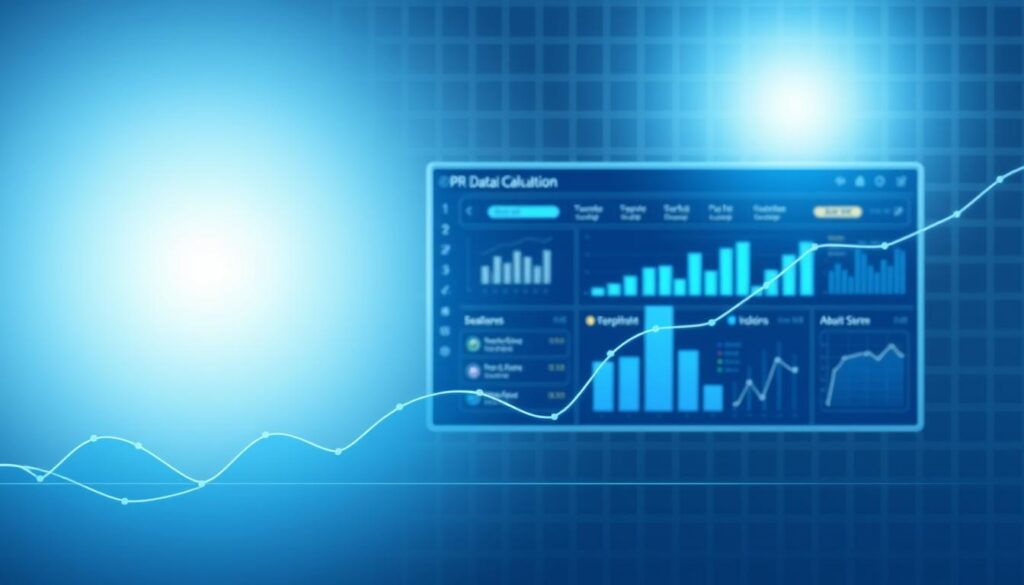In today’s fast-paced digital marketing world, knowing your press release ROI is key. It’s not just about getting press mentions. It’s about seeing how your efforts really impact your business. Brands see that smart press releases can boost website traffic, increase sales, and make their brand more visible.
Now, PR pros use advanced analytics to see the real results of their work. They turn press releases into valuable tools that help their business grow. This way, they can measure how their efforts affect their bottom line.
Companies that use smart PR measurement see big wins. For example, a well-planned press release campaign can raise website traffic by 25%. It can also reach 500,000 readers across 15 media outlets. These numbers show the power of a well-done press release strategy.
Key Takeaways
- Press release ROI goes beyond simple media mentions
- Tracking website traffic and conversion metrics is essential
- Strategic PR measurement can reveal direct revenue impact
- Advanced analytics provide deeper insights into campaign performance
- Media coverage can significantly boost brand awareness
- Quantifiable results help justify PR investment
Understanding PR ROI Fundamentals
Measuring the impact of public relations efforts is a big challenge for today’s communications teams. Only one-third of communications pros feel sure about linking PR to real business results.
A PR ROI definition is more than just tracking media coverage. It’s about understanding how communication strategies add real business value. In today’s data-driven world, measuring PR is crucial.
Defining PR Return on Investment
PR return on investment looks at communication efforts in different ways:
- Quantifying media mentions and potential audience reach
- Tracking website traffic from PR activities
- Measuring brand visibility and sentiment
- Analyzing lead generation and conversion rates
Setting SMART PR Objectives
SMART PR objectives give a clear plan for measuring success:
- Specific: Clearly defined communication goals
- Measurable: Quantifiable outcomes
- Achievable: Realistic target metrics
- Relevant: Aligned with business strategies
- Time-bound: Defined measurement periods
By using these strategies, organizations can turn PR into a clear value creator.
The PR-to-Sales Connection

Understanding how PR affects sales is key. It involves a strategic plan to track the press release sales funnel. Today’s businesses see public relations as vital for boosting revenue, beyond just marketing.
PR’s impact on sales comes through several ways:
- Creating initial brand awareness
- Building credibility with potential customers
- Generating strategic media exposure
- Influencing purchasing decision processes
Thanks to new technology, PR pros can now track how people interact with media more accurately. This tech helps businesses see how press releases lead to sales.
Studies show PR can be a top sales driver for marketing. Strategic press releases can create a lot of market momentum. They often cost less than traditional ads.
Companies that measure PR well get many benefits:
- Deeper understanding of audience engagement
- More accurate tracking of the sales funnel
- Better focus of communication efforts
- Alignment of PR and sales goals
By using modern analytics and teamwork, businesses can turn press releases into active sales tools.
Essential Metrics for Measuring ROI on Press Releases
It’s key to track the right press release metrics to see their real impact. Today’s PR pros use detailed data analysis to show the worth of their strategies.
Good measurement is more than just seeing your release. It’s about linking it to real business results through smart tracking and analysis.
Media Mentions and Reach Analysis
Tracking media mentions gives you vital insights into your release’s success. Look at these important points:
- Total number of media pickups
- Reach and potential audience size
- Quality of publications featuring your content
- Geographical distribution of coverage
Website Traffic and Engagement Metrics
Website analytics for PR show how press releases affect online engagement. Key metrics to watch include:
- Referral traffic from press release links
- Time spent on website
- Pages viewed per session
- Bounce rate reduction
Conversion Rate Tracking
PR conversion rates are the best way to measure release success. Use these tracking methods:
- Use unique tracking URLs
- Create campaign-specific landing pages
- Monitor lead generation sources
- Implement UTM parameters for precise attribution
Pro tip: Use several analytics tools to get a full picture of your press release’s performance and ROI.
Tools and Technologies for PR ROI Tracking
PR measurement needs advanced tools to turn data into useful insights. Today’s PR pros use top-notch media monitoring software and PR analytics platforms. These tools help them track their strategies well.
Here are the main tools for tracking PR ROI:
- Media Monitoring Software: Tools like Meltwater and Brandwatch track brand mentions in real-time across many channels
- Web Analytics Tools: Google Analytics gives deep insights into website traffic and how users engage
- PR Analytics Platforms: These platforms combine data from various sources for a complete view of performance
When picking PR measurement tools, look for these key features:
- Wide coverage of digital and traditional media
- Sentiment analysis tools
- Options to customize reports
- Integration with current marketing tech stacks
Top PR analytics platforms have cool features like Share of Voice tracking, sentiment analysis, and domain authority checks. These tools help PR teams show how their work impacts business. They link PR efforts to company goals.
With advanced PR measurement tools, communications teams can show their value with data and clear ROI numbers.
Quantitative vs Qualitative Measurement Approaches
Measuring press release success needs a mix of numbers and feelings. Businesses must see both the stats and the emotional side of their messages.
Good PR evaluation digs deep into many layers of insight. It’s not just about counting numbers. It’s about understanding what people feel and think too.
Numerical Data Assessment
Quantitative PR measurement gives clear numbers on press release success. Important numbers include:
- Total media mentions
- Website traffic spikes
- Engagement rates
- Social media interactions
Sentiment Analysis Methods
Sentiment analysis for PR shows the emotional side of media coverage. It tells how people feel about what’s being said, not just how many people hear it.
- Tracking positive/negative mentions
- Analyzing emotional language
- Monitoring online conversations
Brand Perception Metrics
Brand perception metrics look at the softer side of PR success. They help understand reputation and connection with the audience.
- Audience trust levels
- Emotional resonance
- Perceived brand authenticity
By using both numbers and feelings, businesses get a full picture of their PR success. They understand how well their messages are working.
Best Practices for PR ROI Calculation

Getting the most out of PR means more than just numbers. It’s about understanding your goals deeply. This is key to effective PR measurement.
Here are some top strategies for calculating PR ROI:
- Set clear, measurable objectives from the start
- Establish baseline metrics before launching campaigns
- Implement consistent tracking methods
- Utilize multiple measurement tools
When you’re calculating PR ROI, focus on what really matters. Look at media coverage, website visits, and social media activity. These show how well your press releases are doing.
Here are some top ways to measure PR ROI:
- Use UTM links to track click-through rates
- Monitor website traffic increases
- Analyze social media mentions and shares
- Evaluate audience engagement levels
Studies show that over 80% of people like brands that give them what they want. Using strong PR ROI methods shows your impact. It helps improve your strategies for the future.
But remember, PR measurement is not just about now. Think about the long-term effects and keep getting better at measuring.
Common Challenges and Solutions in PR Measurement
PR measurement is complex and full of challenges for communication experts. It’s like solving a puzzle with missing pieces. To track the impact of press releases, you need smart strategies and creative ideas.
Getting data for PR is a big problem for many groups. In 2019, 72% of PR pros said measuring business impact was their biggest challenge. This makes it hard to show the real value of their work.
Overcoming Data Collection Obstacles
Good data collection can turn PR measurement into clear analysis. Here are some ways to do it:
- Use advanced tracking tools
- Set clear measurement goals
- Combine different data sources
- Make detailed tracking dashboards
Addressing PR Attribution Issues
PR attribution problems make it hard to know which efforts work. To solve this, try these steps:
- Use unique tracking URLs
- Identify campaigns with special codes
- Look at website traffic changes
- Compare before and after campaign results
Budget Optimization Strategies
Smart budget use means making strategic choices. Marketing and PR budgets are usually 5% to 12% of a company’s revenue. Use your money wisely by focusing on important metrics like domain authority and social media engagement.
By using tech like AI and predictive analytics, PR pros can measure more effectively. This shows the real value of their work.
Conclusion
Knowing how to measure PR ROI is key for businesses wanting to get the most from their communication plans. The world of press release effectiveness has changed a lot. Now, we have better tools and metrics to track how media affects us.
By using smart PR strategy optimization, companies can make press releases more than just a way to share news. They can become real business tools.
The Barcelona Declaration of Measurement shows a big push for better PR evaluation worldwide. Over 200 delegates from 30 countries agreed on this. Today, communication experts can use advanced analytics to see how well their campaigns are doing.
It’s not just about the numbers. It’s about knowing how people interact with your brand and how it affects your business in the long run. Companies that put effort into measuring their PR can gain a big edge over their competitors.
For those wanting to improve their PR measurement, working with experts like Crowley Media Group can be a big help. They offer services in SEO, PPC, AI, and automation. This can turn data into useful insights that help your business grow.








